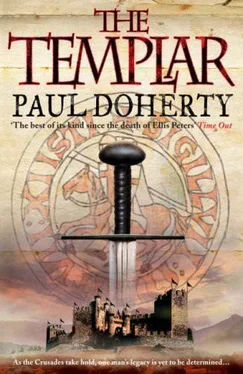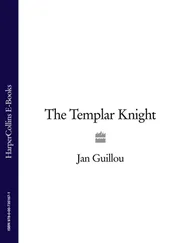P. Doherty - The Templar
Здесь есть возможность читать онлайн «P. Doherty - The Templar» весь текст электронной книги совершенно бесплатно (целиком полную версию без сокращений). В некоторых случаях можно слушать аудио, скачать через торрент в формате fb2 и присутствует краткое содержание. Год выпуска: 2010, ISBN: 2010, Издательство: Minotaur Books, Жанр: Исторические приключения, на английском языке. Описание произведения, (предисловие) а так же отзывы посетителей доступны на портале библиотеки ЛибКат.
- Название:The Templar
- Автор:
- Издательство:Minotaur Books
- Жанр:
- Год:2010
- ISBN:9780312576837
- Рейтинг книги:5 / 5. Голосов: 1
-
Избранное:Добавить в избранное
- Отзывы:
-
Ваша оценка:
- 100
- 1
- 2
- 3
- 4
- 5
The Templar: краткое содержание, описание и аннотация
Предлагаем к чтению аннотацию, описание, краткое содержание или предисловие (зависит от того, что написал сам автор книги «The Templar»). Если вы не нашли необходимую информацию о книге — напишите в комментариях, мы постараемся отыскать её.
The Templar — читать онлайн бесплатно полную книгу (весь текст) целиком
Ниже представлен текст книги, разбитый по страницам. Система сохранения места последней прочитанной страницы, позволяет с удобством читать онлайн бесплатно книгу «The Templar», без необходимости каждый раз заново искать на чём Вы остановились. Поставьте закладку, и сможете в любой момент перейти на страницу, на которой закончили чтение.
Интервал:
Закладка:
Eleanor turned to Theodore. ‘And you believe this?’
‘Passionately, sister. I too wish to secure my faith on something.’
‘You mentioned danger?’
‘And their name is Legion,’ Godefroi replied, leaning across the table. ‘Eleanor, we have seen what is happening within our own small communities. Churches, monasteries and abbeys are founded and each hungers for its own relics. Can you imagine what would happen if the relics we’ve described were brought into the marketplace to be sold to the highest bidder? A veritable fortune could be made. A king’s ransom demanded. We know little about Anstritha. She was frightened to tell Alberic and Norbert the full truth, but her half-brother may have been a man called the Magus, named after Simon Magus, the magician who tried to buy the spiritual powers of St Peter and was punished for his sins. This Magus lurks deep in the shadows. He peddles sacred relics as a butcher would hunks of meat. He has been hired by city communes and councils to secure relics by fair means or foul, usually the latter. We believe, though we have little proof, that this Magus is probably the masked horseman who stirred up the villagers against Anstritha, silenced her mouth once and for all and ransacked her possessions, possibly searching for the map you have given us. The Magus tried to steal the corpse of St Modaldus from the Church of St Symphronius in Trier but failed when her body began to bleed. He was more successful in other ventures: the body of St Sanctus from a church in Meaux and that of St Nicholas from Myra which he sold to the city of Bari.’
‘Who is he? Where is he?’
‘We don’t know. He may be one of us, but,’ Hugh pointed at the square of parchment, ‘he would be deeply interested in that. Perhaps,’ he shrugged, ‘he is a member of the Beggars’ Company. If so, there will be further trouble with that coven.’
‘They have already invoked the blood feud against us,’ Theodore added quickly, ‘for the death of their comrades.’
‘Rapists and murderers,’ Eleanor retorted. ‘Count Raymond fully approved of what Hugh did.’
‘I hope God does.’ Hugh replied wearily. ‘The Beggars will have to be watched, but in the end, the relics of the Lord’s Passion are what we seek. Eleanor, we waited until now to tell you the full truth, for to do so earlier may have been dangerous. The Magus will strike at anyone who has knowledge of this, and that now includes you. The dangers, as Godefroi said, are many. Alberic and Norbert are devoted servants of the Poor Brethren but they have brought a legion of other troubles with them.’ Hugh walked to the window, then crossed to the door. He opened this, closed it and returned to the table. ‘We all know about the Holy Father’s sermon at Clermont, but that is not the full truth of our situation. Alberic and Norbert are our teachers in this. They also spent years with the teachers of Islam, who have a faith as certain and firm as ours. They too have their own codes and laws. They too regard Jerusalem as sacred. They call the Dome of the Rock ‘a Noble Sanctuary, the Haram’, a revered site. According to their faith, the great Prophet Muhammad, having fallen asleep while praying in his home town of Mecca, was woken by the Angel Gabriel. He mounted a winged horse called Al-Buraq and was taken “to the most furthest place”, the Dome of the Rock. Once there, the great Prophet ascended into heaven to pray with Abraham, Moses, Jesus and the other leading prophets, as well as receive final instruction for his teaching.’
‘The Dome of the Rock is a Holy Place for all faiths,’ Theodore took up the story, ‘and, therefore, a powerful attraction for fanatics, be they Frankish, Muslim or Jewish. One Muslim group, a heretical sect called the Fedawi — the Devoted Ones — are committed to guarding the Dome of the Rock and all its secrets. They are assassins garbed in white with blood-red girdle and slippers. Each carries two long curved daggers. They answer only to their leader, Sheik Al Jehal. They are feared and hated by other followers of Islam, who regard them as heretics because, full of wine mixed with opium, they will strike at those who oppose them or whomever they regard as an enemy.’
Hugh fumbled at his wallet and drew out a roll of parchment.
‘Alberic and Norbert had to flee Jerusalem. Their search for the secret chambers provoked suspicions amongst the Fedawi. One morning they woke to find a dagger thrust into the bolster of a bed with a scroll bearing a warning.’ Hugh unrolled the parchment and read its contents:
What you possess shall escape you in the end and return to us.
Know that we hold you and will keep you until the account is settled.
Know you that we go forth and return as we wish.
Know you that by no means can you hinder us or escape.
Hugh threw the parchment down on the table. Eleanor picked it up and studied the writing. The Norman French letters were perfectly formed.
‘This was delivered to them?’ she asked. ‘They were marked down for death?’
‘Something similar,’ Theodore replied, ‘but that,’ he pointed to the parchment, ‘was delivered to us.’ He leaned underneath the table, undid the straps to the panniers he usually carried over his shoulder and drew out two long curved daggers bound together by a blood-red cord.
‘We are,’ intoned Hugh as if reciting a prayer, ‘the Poor Brethren of the Temple; we will, God willing, take Jerusalem and the treasures it holds. We will be a community zealous in our service to the Lord, dedicated to preserving His name and the glory of His Passion. We do not seek the blood of Jew or Muslim but we will follow our vision, for as the Book of Proverbs says: “Where there is no vision on the earth, the people perish.” ’
‘And the warning?’ Eleanor asked, curbing her fear.
‘The same as that given to Brother Norbert and Father Alberic,’ Hugh replied softly. ‘Pinned to a bolster two nights ago. The Fedawi know what we intend, and they are waiting!’
Part 5
Dorylaeum: The Feast of St James the Apostle, 25 July 1097
Hominumque contentio mundi hujus et cupido .
(A day when strife amongst men and the lusts of this world are over.)
The Dies Irae of St Columba
Deus Vult! God wills it! The hoarse battle cry rang through the valley, echoing up to the pine-edged hilltops, scattering the birds from the cypress trees. Yes, Deus vult , Eleanor reflected, as she sat on a pile of cushions in the looted tent close to the battlefield of Dorylaeum. Dust devils swirled through the flaps of the gorgeous but fire-singed pavilion of expensive cloth with its ornate gold fringes. To the right of the flap stretched a great splash of dried blood; Eleanor tried to ignore this as she dictated to Simeon the Scribe, the man of a thousand faiths, as he described himself. A Copt, a prisoner whom Eleanor had rescued from the blood-spattered mace of Babewyn, Simeon sat waiting patiently for his ‘mistress-sister’ to collect her thoughts. He had everything ready: the writing tray, the sharpened quills, ink horns, pumice stone, a little sand, as well as rolls of looted parchment. Simeon, whose Coptic name Eleanor found difficult to pronounce, stared adoringly at his saviour whilst quietly congratulating himself on his innate skill at surviving. A trained scribe, knowledgeable in Greek and Frankish, not to mention Latin and the lingua franca of the ports, he had served Fatimid, Seljuk, Greek and Frank as well as Armenian, Syrian and Jewish masters. He was a skilled scholar, and could prepare manuscripts, write in cipher, and worship God in any way his masters wanted him to. On the morning of 19 July 1097, Simeon awoke a devout Muslim; by the time he succumbed to a fitful, nightmare-ridden sleep that same day, he was, according to the subtle tale he told Eleanor, a devout Christian captured by the Sultan of Rhum outside Nicomedea. Nevertheless, Simeon, as he now called himself — after Simeon Stylites, the hermit who lived for years on top of a pillar — truly liked Eleanor. He admired her solemn pale face, framed by its veil of black hair, and those lively smiling eyes. If she wanted to recall the stupendous events, as she described them, that accompanied the Franks and their foolish journey to Jerusalem, then he was her man, though he fully intended not to share her fate. If the Turks attacked and were victorious, Simeon quietly promised himself that he would hide as he had done last time, survive the axe, sword or lance and declare himself the most devout of Muslims.
Читать дальшеИнтервал:
Закладка:
Похожие книги на «The Templar»
Представляем Вашему вниманию похожие книги на «The Templar» списком для выбора. Мы отобрали схожую по названию и смыслу литературу в надежде предоставить читателям больше вариантов отыскать новые, интересные, ещё непрочитанные произведения.
Обсуждение, отзывы о книге «The Templar» и просто собственные мнения читателей. Оставьте ваши комментарии, напишите, что Вы думаете о произведении, его смысле или главных героях. Укажите что конкретно понравилось, а что нет, и почему Вы так считаете.












